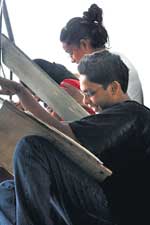| A riot of
art
Marisa de Silva journeys into the
wonders of art education at the Cora Abraham School
of Art
"Have you ever seen your little
girl hop on one leg gleefully declaring she could fly?
Does she delight in a rainbow-coloured pool she discovered
in a puddle of rainwater? Perhaps you've seen your son
sitting on your front doorstep, chin in hand, watching
the construction of a huge cobweb in the garden, glinting
gold and silver in the sun.
 |
| Pix. By M.A. Pushpa
Kumara |
Yet, do most of these beautiful experiences
only belong in the past when we as children had the
precious gift of 'Time' to dream and make believe?
Today our children are 'tuition-tossed'
in a rushing, never-ending stream of class upon class.
Could they pause for a moment to see a flash of yellow,
fly across their garden announcing 'I am a Golden Oriole!
I am a Golden Oriole!'? Most often they are trapped
in a whizzing vehicle, their heads bent over homework
they haven't done or in a state of tension because they're
late for their class.
How can we bring back the Utopian
era of The Child? Rabindranath Tagore, in his autobiography
says that the freedom he was given as a child made him
the thinker he became. No toys cluttered up his room.
His favourite object to play with was an old palanquin
at the bottom of his garden! It became his palace, his
courtroom, his stage… whatever his imagination
declared it was!" - 'Art Education' - Nalini Weerasinghe,
Art Educationist and Principal of the Cora Abraham Art
Classes (CAAC).
"The most important thing you
need to keep in mind is that CAAC is not an 'art class'
in the conventional sense of the term; it's got more
to do with art as a part of a child's education and
it's role in the whole developmental process of a child,"
explains Ms. Weerasinghe passionately. The children
are not instructed at all; they are given the opportunity
to think and express themselves freely, thus helping
their personality growth and overall development as
well, she added. As the famous Art Educator Viktor Lowenfield
says in his book Creative Mental Growth: "Art Education
introduced in the early years of childhood, may well
mean the difference between a flexible creative human
being, and one who in spite of all learning will not
be able to apply it and remain an individual who lacks
inner resources and has difficulty in relationship to
his environment."
The founder of this school Cora Abraham,
started it off way back in 1949, with the intention
of giving children the freedom to express themselves.
Ms. Weerasinghe, then a student, later trained under
Ms. Abraham as a teacher and subsequently took over
as Principal in1980, following her death. She then took
over from where Mrs. Abraham had left off and carried
on the good work and novel concept of art education.
For instance when she kept the art
school open during the '83 riots, many kids kept coming
for class and it turned out being quite therapeutic
for them too, not only did they get away from the horrific
reality of their houses and neighbourhood being in flames,
it was also a catharsis for them to vent out their innermost
feelings such as fear and confusion etc., explained
Mrs. Weersasinghe. "The children just come sit
down and paint.
They're mostly inspired by the environment,
what they see, think and feel so it's quite fascinating
to see what they (especially the younger ones) come
up with," she said smiling.
They absorb their surroundings and
then draw their own perspectives of what they come across.
By this kind of freethinking, they also build up their
confidence and learn to use their strengths and experiment
on their own. "Teachers are only there to inspire,
they don't tell the children what to do, they only provide
the necessary material (paints, paper, charcoal etc.,)
and the children are given a free-hand to draw whatever
catches their eye," she emphasised.
For instance, the teachers create
a particular experience for the 8-10 age group (e.g.
come dressed up like their favourite animal and enact
it at class. Thereafter, they are asked to draw these
animals. Or even the 4+ age groupers, who are very intense
in their thinking, draw what they know and not what
they see, she explained. They depict their idea of a
specific situation or certain people and not what they
see before them. Another exercise the children do is
pick up various objects from outside, observe them,
then draw and paint what they see, she explained. "It's
amazing to see their imaginations run riot!"
The over 150 students ranging from
4+ to 16 can use whatever medium they like or even opt
to sculpt, if they so desire. All possible material
(e.g. paints, brushes, charcoal, pens, papers, clay
etc.,) is provided by the school. Students of the CAAC
range from the likes of graphic designers, to artists,
to jewellery designers etc., "And there's nothing
more rewarding for us, as teachers, than a student who
has genuinely befitted from art education, like for
instance a past pupil of the school (who's now a successful
graphic designer abroad) told me recently, 'this school
made me'," she recalled with pride.
Contact :
Mrs. Nalini Weerasinghe,
Principal,Cora Abraham Art Classes,237/76, Polhengoda
Road,
Off Siebel Avenue, Colombo - 05, Tel: 2852494
|
